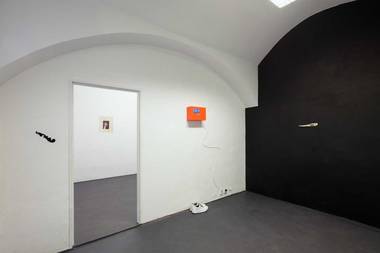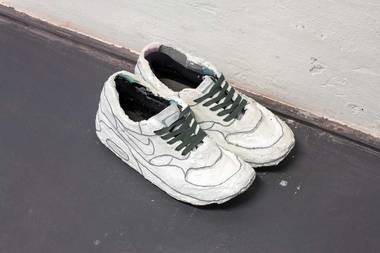Martin Kolarov, Filip Dvořák: HashtagNike
4. 3. – 26. 3. 2015
Opening: 3. 3. 2015
How to be a successful contemporary artist
- Do what interests you. Don’t look too far into the world of art celebrities, everything is lying down right at your feet, all you need to do is focus your eyes on detail and know how to use it.
- Be aware of your abilities and choose the type of art and technique that you can manage. Art has many forms and everyone can find his/her own. In spite of the fact that you can’t do anything, you can accomplish almost everything.
- Don’t be a megalomaniac. There is no need to create large statues that you’ll have problem storing, or paintings that you won’t be able to transport anywhere. Consider your financial possibilities. Large does not mean good, and a lot is not automatically significant.
- Create a distinguishable, while interchangeable style. Ideally such a style that will be able to be defined with the help of several formal principles and concentrated on one general topic. Try to make the general more specific from exhibition to exhibition.
- Find out what current art looks like. It cannot hurt you. Meaning is born from observation.
- Take risks. Regardless of the character of contemporary art, don’t be afraid to come up with inadequate, anachronistic types of solutions.
- Love shows an artist the goal of his/her work. The mind shows the means how to make it happen.
- Regardless of a cold reaction to your exhibition, continue to work. And if you are satisfied with yourself, consider it to be a success. Unless it is extraordinary, no one will remember it soon anyway. And critique? That’s only a joke in the Czech Republic.
- Don’t avoid the media and publicity but make sure to be aware of their character. Don’t pay attention to the questions, always say what you need to. A little bit of controversy is never out of place. Never pretend to be an intellectual, however. No one expects that from an artist. Why would they for that matter.
- Should you be branded with some media label, don’t fight it but use it to your advantage.
- Try to avoid irony in your work, but not in your discussions about art. You can use it generously there with respect to yourself, as well as others. Self-irony arouses fondness.
- Don’t ever explain your art. Speak around it, beside it, about yourself, but never about it. You can describe reasons, causes, inspirations, but avoid interpretations about what is what in your work. It always appears as naive, annoying or foolish.
- Be nice, you are surrounded by your colleagues, curators, and institution heads. Remember that their memory is big and that they probably have a certain dose of vanity. They are also only people who appreciate a kind human word.
- Dress well and have a style. Even a drunk doesn’t looks like a castaway if he’s dressed well.
- Be social; build a network of friends, acquaintances and contacts. Don’t be afraid of the word clientelism. Take advantage of opportunities but the word opportunism is forbidden. Don’t overdo it. Nothing is more annoying than an uncovered opportunist.
- Although you want to achieve immortality, be aware that the present is the time when you create.
- Don’t ever complain about insufficient success, about disappointment from your colleagues, or about commitments not kept. Don’t go back to the past to recount the wrongs. There is no better way to dispirit your surroundings.
- Be consistent in your stands, others will know what to expect of you. Curators are not exactly people who love surprises.
- Don’t underestimate your presentation on the web; consistently updated and rich curriculum vitae can do wonders. People around art like ladders and enumerations. You should provide them.
- Work hard but hide it. Act like a lounger who has talent from God. If the artistic community believes it, then be sure it will be your golden talent.
- Don’t be afraid and don’t steal’ hardly applies in contemporary art. The instructions copy and paste are deeply interconnected with our reality. How else could it be in the Internet era, for that matter?
- Get a degree from an art school but don’t think too highly of it. Your interests and goals lie outside. Being at the top of the class is definitely no victory. Nobody likes swots.
- Create your own story. Know how to simplify your life and approach to art into several sentences. Yes, it is confusing and atrociously simplifying but it’s extremely important. Drugs, alcohol, addictions, poverty and a subsequent victory over these is always useful. Succeed despite of all circumstances.
- Believe in art, but be sceptical towards it. Neither feelings nor will are an argument when reason is missing.
- Always criticize neo-liberal society and the art market, at least until the time you start to sell a lot.
- Help your colleagues at least at the beginning of your carrier. It’s an investment that always pays off.
- In the beginning, invest all your surpluses into art but not to the extent that it would paralyse your life. Then it’s better to change your conception.
- Learn to speak English. Poor English is the language of art.
- Your art will always be based on local associations, it’s not necessary to emphasize that. A global attribution means accessible and fitting. Imagine how your art is placed in an important international gallery. If you have a feeling that it will fail, then you’re doing something wrong.
- Always remember that the impossible exists. Go for it.
Author of text: Marek Meduna
Jeleni Gallery is supported by: Ministry of Culture of the Czech Republic, City of Prague, State Culture Fund of the Czech Republic
Media Partners: Artycok.tv, ArtMap a jlbjlt.net














